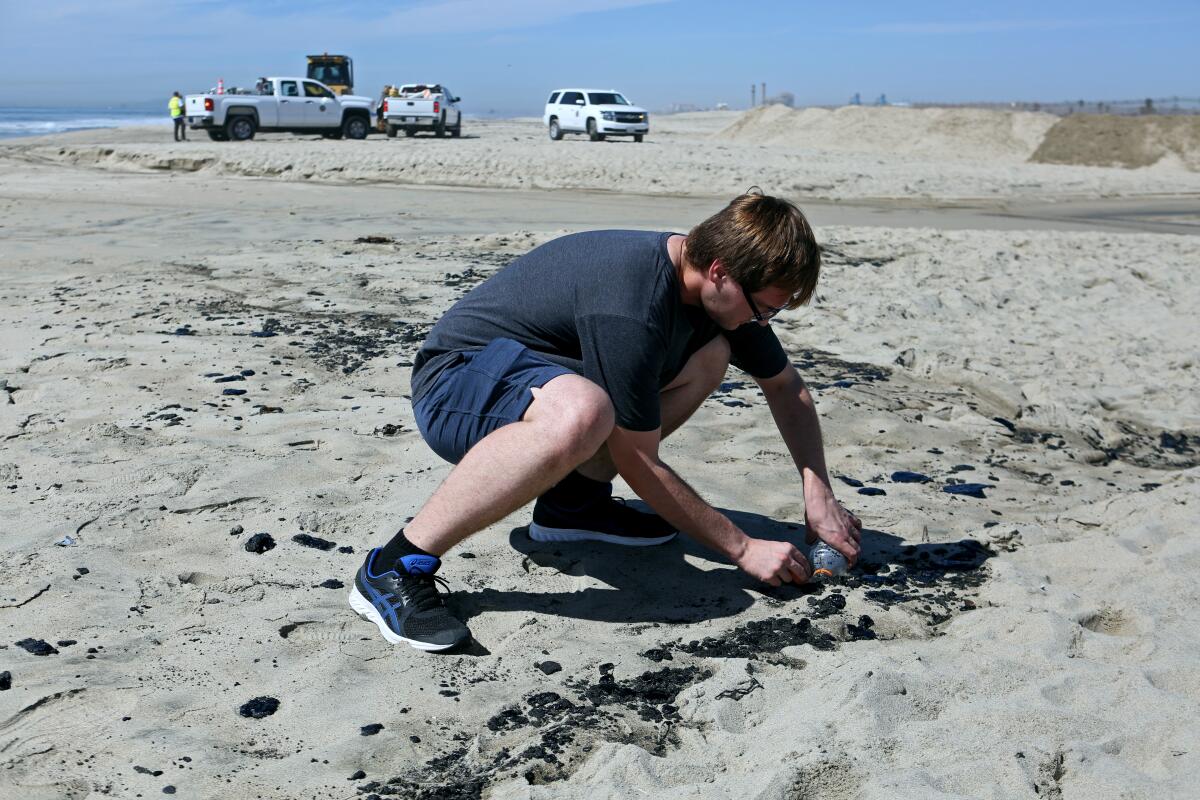Huntington Beach City Council votes to support ban on new offshore oil drilling
- Share via
The Huntington Beach City Council voted Tuesday night to support a ban on new offshore oil drilling and similar activities off the coast of California.
Mayor Kim Carr and Councilwoman Natalie Moser brought the item forward after the Oct. 1 oil spill a few miles off the Huntington Beach coast, believed to be caused by a ship anchor that dragged an underwater Amplify Energy pipeline that subsequently dumped an estimated 25,000 gallons of crude oil into the water.
Carr, Moser, Mayor Pro Tem Barbara Delgleize, Rhonda Bolton and Dan Kalmick supported the item. Councilman Mike Posey voted against it, while Councilman Erik Peterson was absent.
Carr emphasized that the city receives nothing from the oil platforms off the coast. City spokeswoman Jennifer Carey said Huntington Beach makes just $632,000 a year in oil well license taxes and pipeline franchise fees — less than 1% of the city’s general fund budget.
“Fortunately, the oil spill was a lot less than [a previous high-end estimate of 144,000 gallons], but it was still thousands of gallons that reached our shoreline,” Carr said. “In a lot of ways, we dodged a bullet with this one, but we can’t be naïve and think this won’t happen again.
“It’s really disturbing to learn that there were a lot of safety precautions that were not taken, there were a lot of corners that appear to have been cut. A lot of the alarms that should have gone off didn’t go off, so I think we need to be more forward-thinking.”
Carr said she believes it makes sense to look at alternative forms of energy that don’t include drilling.
“I think this resolution is a good first step,” she said.

Moser shared a story about how her late father, who had Parkinson’s disease and dementia, had totaled his truck after hitting a pole.
“We were really lucky because he was safe and he didn’t hit anybody,” she said. “He decided in that moment not to drive ever again ... and it came to me when I was thinking about this. We experienced this tragedy, and it’s an opportunity in this moment to put our foot down and acknowledge the value of our coastline, our environment, our sensitive ecological areas here, our businesses, and say ‘no more’ moving forward.”
Members of San Clemente-based nonprofit Surfrider Foundation attended Tuesday’s meeting, bringing with them signs and a banner supporting the ban. They joined many other local environmental groups, including Amigos De Bolsa Chica and Orange County Coastkeeper.
Surfrider officials said Huntington Beach became the 100th West Coast community to pass a resolution officially opposing the expansion of offshore oil and gas drilling.
“The Surfrider Foundation has fought long and hard to stop offshore drilling and we are pleased to celebrate this meaningful victory,” said Bill Hickman, Surfrider Southern California regional manager, in a statement. “As oil is still washing up on our beloved coasts in Southern California, we are witnessing first-hand the devastating repercussions of offshore drilling off our coastlines. The decision made by the city of Huntington Beach to oppose offshore drilling shows leadership, and we commend their efforts to avoid the same disaster from happening again.”
Posey, the lone dissenter, said he cares deeply about the beach and the ocean. However, he said, the city has no jurisdiction over the waters off its coast.
“I think as [renewable energy] technology evolves, the demand for fossil fuels will decline all on its own, driven by the marketplace,” he said. “I’m also concerned with acknowledging in a resolution economic impacts and putting that in writing, with the threat of potential litigation.”
All the latest on Orange County from Orange County.
Get our free TimesOC newsletter.
You may occasionally receive promotional content from the Daily Pilot.




